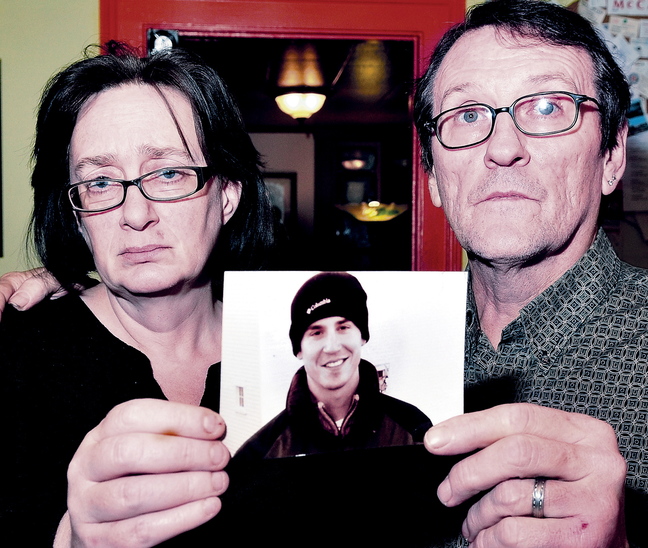PORTLAND — The parents of a 28-year-old U.S. Army veteran who was shot and killed by a Farmington police officer in 2011 have a filed a lawsuit in federal court seeking unspecified monetary damages for civil rights violations and the wrongful death of their son.
Ruth E. Crowley of Milwaukie, Ore., and Michael Smilek of Farmington are claiming wrongful use of deadly force and violations of the Maine and U.S. constitutions in the shooting death of their son, Justin Crowley-Smilek. Named as defendants in the eight-count filing are Farmington police Officer Ryan Rosie, who shot Crowley-Smilek; Police Chief Jack Peck, who was Rosie’s supervisor; and the town of Farmington.
Attorney Douglas I. Louison of Boston, who is representing Rosie, Peck and the town of Farmington, did not immediately return a call for comment on the case Monday.
Farmington Town Manager Richard Davis said Monday that the attorneys still are formulating a response to the claims made by Smilek and Crowley.
“I can’t comment while it’s an active lawsuit,” Davis said. “The town will defend itself against the claim.”
Crowley-Smilek, a former Army Ranger who suffered from combat stress and physical injuries from service in Afghanistan, was armed with a large knife when he arrived at the Farmington municipal building just before 11 a.m. Nov. 19, 2011. He used a call box mounted on the building to contact the Police Department.
The lawsuit claims Crowley-Smilek went to the Police Department for help regarding mental health problems. Rosie went to the front entrance of the building, stepped outside and he saw a man – later identified to be Justin Crowley-Smilek – walking away, according to a report of the incident in May 2012 by then-State Attorney General William J. Schneider.
Schneider concluded the shooting was justified.
The lawsuit contends that Rosie panicked after he called out to Crowley-Smilek and saw he had a knife. Rosie took cover behind a police cruiser and drew his service firearm and fired seven or more shots at Crowley-Smilek, killing him, according to court documents.
The lawsuit claims Rosie never called for additional police help or retreated back to the police station, points that conflict with the state attorney general’s findings, which reported that Rosie used his lapel microphone to call for help.
Schneider said in his final report that it was reasonable for Rosie to believe that he was threatened with imminent deadly force and that it was necessary for him to use deadly force to protect himself. He said police officers often are forced to make split-second decisions about the amount of force necessary.
Crowley-Smilek’s parents disagree, saying in the lawsuit that Rosie used excessive and unreasonable force that was a violation of their son’s constitutional right against unlawful searches and seizures. They claim Rosie continued to fire shots at Crowley-Smilek after he was down and no longer armed. They assert it was Rosie who assaulted Crowley-Smilek, not the other way around.
The parents also claim Peck and the town were responsible for assuring the community that Rosie was properly trained and supervised.
At the time of the shooting, Rosie had not yet entered the 18-week training program at the Maine Criminal Justice Academy. Rosie had been hired as a full-time police officer in June 2011.
Rosie graduated from Lake Superior State University with a bachelor’s degree in criminal justice in 2009. He was set to enter the academy training program in January 2012. Rosie had experience as a reserve officer and a dispatcher before being hired full time, according to published reports.
Peck, the police chief, said Rosie had been trained in the use of firearms and a stun gun. Rosie was carrying a stun gun, but did not use it.
“He has gone through the pre-service training, a 100-hour course,” Peck said in the weeks after the shooting. “Then we put him through a six-week training class. Then we have online training classes that are mandated by the state, so it wasn’t like we just threw him in a cruiser and said here’s a gun, have a good day.”
Crowley-Smilek served four months in Afghanistan before his discharge under honorable conditions in June 2007.
In the weeks leading up to the shooting, Crowley-Smilek had slipped into paranoia and delusion from the effects of post-traumatic stress disorder and bipolar disorder, according to family members and his girlfriend. He also suffered extreme back pain from a 30-foot fall from a helicopter in Afghanistan, they said.
Michael Smilek and Kary Laban, a licensed clinical counselor who treated Crowley-Smilek, said they did not believe he was suicidal.
Crowley-Smilek’s girlfriend, Destiny Cook, also of Farmington, said he had left his watch, his wallet, his cellphone and his therapy dog at his apartment, which indicated to her that he did not plan to return and that he wanted to die.
Michael Smilek said in an interview after the shooting that when Justin returned to Farmington as a civilian he couldn’t function in society.
Michael Smilek said his son took his medication at first and attended sessions with Laban at the Farmington Veterans’ Center for counseling and at the Togus veterans hospital. However, he said his son had stopped taking his medications shortly before the shooting.
Crowley-Smilek began getting into trouble with police back home in Farmington in 2007 when he was arrested on charges of operating after suspension, criminal mischief and violation of conditions of bail.
He was arrested again in 2009 on a charge of violating the conditions of his release, according to newspaper archives.
In April 2010, Crowley-Smilek pleaded guilty to carrying a concealed weapon without a permit in connection with an incident at University of Maine at Farmington a month earlier, in which he was found in possession of a loaded handgun at a basketball game.
Doug Harlow can be contacted at 612-2367 or at:
dharlow@centralmaine.com
Twitter: @Doug_Harlow
Send questions/comments to the editors.



Comments are no longer available on this story